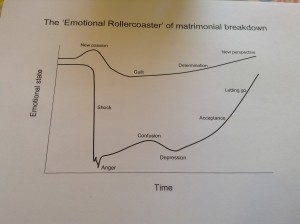In this blog series we are looking at the immediate days and weeks following the decision to separate. In the first blog we gave some guidance on some things you might want to consider in order to be sure that you have exhausted all avenues in making the decision to separate. Most people want to feel that they have tried their hardest to save the relationship before ending it. In the second blog we gave some tips on how to have that difficult conversation with your partner that you want to separate. For most people once the conversation has been had and the decision made at some point they start to wonder when they should look at resolving all the issues that a separation creates. This is the subject of this third blog.
We would love to be able to give you a clear formula for exactly when it’s OK to start looking at a resolution but it really is down to how you both feel and it’s important to consider:
- How you each feel – do you feel able to weigh up big decisions about what happens next?
- Your emotional readiness to talk about these issues. If you are feeling hugely emotional and don’t feel you have moved very far through the grief process then it’s likely to be better to wait. This applies to both of you so even if you feel ready does your ex-partner?
There may be short term things you need to sort out. This might be how bills will be paid, or the logistics of one of you moving out, or it might be when you will talk to your children about the fact you’re separating. Remember that short term solutions just need to be acceptable and don’t need to be brilliant. You just need to know how you will arrange things in the next few months pending you both feeling a bit more equipped to talk about the longer term.
If you’re not sure what the grief process looks like then have a look at this picture. You may also find this blog on the grief of divorce helpful.
It’s important to think about where both of you are at in this grief process. It’s pretty common for the two people involved to be at different stages in the grief process and that in itself can be a barrier to effective communication and to you being able to work together to resolve the various issues.
It can be really frustrating when you have been contemplating the end of the relationship for some time. You may have been unhappy for months or even years, and now that you have told your partner you want to separate you want to move forward into the next chapter of your life. This is understandable and you may feel frustrated that your partner is not willing to look to the future, or to talk about what happens next. But your partner (or ex partner if that’s how you now think of them) may not have been thinking about the relationship ending and they may only be starting the grief process following your conversation. This means they might be some way behind you in the grief process and will need time, space and understanding to move through this before being able to look at the issues.
Sometimes people can feel like they need to move more quickly. There may be financial pressures, there may be reasons why acting now will be to your advantage, you may also find continuing to live in the same house intolerable. The difficulty is that pushing your ex partner to resolve things before they are ready can mean the process of resolving things is a lot more difficult. To put it simply if resolving things now means pushing against the tide then it might take you longer and might cost you more money. If your ex partner is struggling to come to terms with your separation but you push them to resolve things then it might end up taking you a year and costing you £5,000 to £10,000 in legal fees. Whereas if you decided to give them some space for 3 months and then came together when they were in a better place you might find you easily resolve things within 4 months and need a fraction of the legal help which saves you both money – meaning you have more left to house yourselves. This is of course a fictitious example to illustrate a point and everyone’s situations will be different. There is no set time frame for the grief process. Some people report they feel OK within 6 months whereas others report still not feeling grief free 2 years after a separation. You don’t need to be completely through the grief process to start talking about what happens next but it helps to have travelled some way through it. You need to be able to appraise different options and make decisions about your future. You need to feel confident in making those decisions and this can be hard when your emotions are up and down and you still feel very emotional about the situation. It can also make talking about things difficult and this is an essential part of trying to work out what happens next.
It can help to look at what support you each need to feel equipped to talk about what happens next. You might feel you need some guidance from a lawyer about what you need to think about and to feel you’re protecting your own interests. You might need counselling to feel more emotionally equipped to make decisions, or to have strategies for managing the anger, upset and anxiety you might feel. You might need financial advice to ensure you understand the options open to you and to feel reassured that you are able to make ends meet. Thinking about what you personally need to feel able to talk about things calmly and to make decisions is a good way of looking at things. You can be paralysed by reading lots online and not all will be appropriate for you. But think about what you personally need. Where do you feel confident and where do you feel you lack confidence in making decisions about your future?
Breaking big decisions down into smaller steps can also be a useful tool to prevent overwhelm. You can take different parts of the decision, or look at what happens in the next few weeks, and then what happens after that. Working with a mediator is a great way of being supported to talk about the decisions you need to make and the mediator will help you break things down into smaller steps. You can also use different professionals like lawyers, counsellors and financial advisors to support the work being done in mediation meetings, so is properly tailored to your needs.
If you would like help in managing your separation in the most constructive and peaceful way possible then you can sign up to our free mailing list. You can also download our free mini guide to separation as part of this.
We also run a free Facebook group where those going through a separation can talk to others in the same situation (people are at varying stages in the separation so can share experiences at all stages) and where professionals come in and talk to you about issues you’re facing and how to deal with them. It’s called Soulful Separation Support.



